Good Disability Policy is Good Environmental Policy
Apr 24, 2024
This month, thanks to your support, LCV continued to work to protect the lives and health of people impacted by the climate crisis and toxic pollution, and to compel our elected leaders to equitably expand clean, renewable energy as a core driver of climate solutions, environmental justice, good-paying jobs, and energy independence.
We further intensified our advocacy campaign to push members of Congress and President Biden to swiftly finalize and enact into law the $555 billion in equitable climate investments already passed by the U.S. House. These investments need only 51 votes in the Senate and would be transformative in meeting the urgent need to cut U.S. emissions by at least 50% by 2030 and put our nation on the path to 100% clean energy.
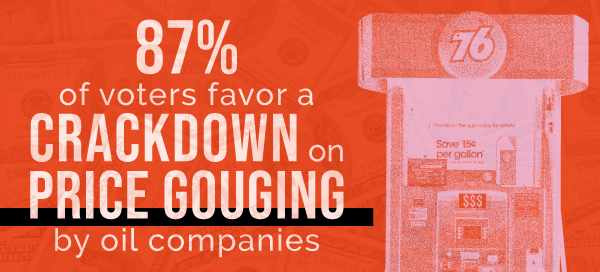
We continued to publicly call out oil companies for price gouging and obscene profits while families struggle with rising costs and the negative health impacts of pollution. We sent a letter urging members of Congress to support a bill to crack down on artificially high prices – a move that, according to our recent poll, is supported by 87% of voters. We applauded when the House passed the Consumer Fuel Price Gouging Prevention Act on May 19, and we now call on the Senate to do the same.
And now, here are your May LCV Top 5 items in the fight for a safer, more equitable, and more sustainable future for all:
1.) LCV Advocacy Days Bring Leaders from Across Our Movement to Washington, D.C.
Over the last year, LCV’s organizing teams and state partners in the Conservation Voter Movement (CVM) have hosted meetings with legislators, knocked on more than 550,000 doors, met with over 26,000 local businesses, and rallied supporters in our nationwide campaign to demand climate action NOW.
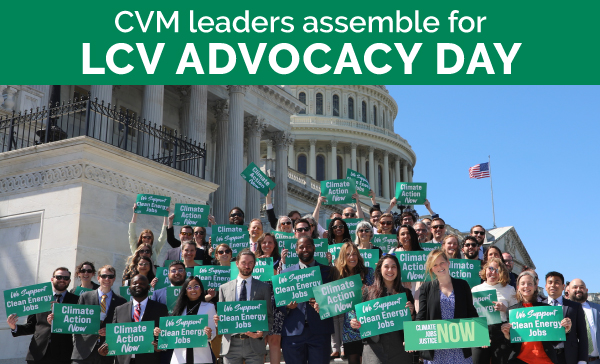
On May 10-12, leaders from across the Conservation Voter Movement converged in Washington, D.C. and held more than 100 meetings with members of Congress and senior officials in the Biden-Harris administration to urge them to finalize climate legislation at the scale that science and justice demand. Because of the pandemic, this was our first “fly-in” in three years, and it comes at a critical time in Senate negotiations to advance the $555 billion climate, jobs and environmental justice investments that have passed the U.S. House.
We also held a press event with Sen. Tina Smith, Rep. Lauren Underwood, House Select Committee on the Climate Crisis Chair Kathy Castor, and advocates from our state partners on the need to pass climate action now. SEE photos from our meetings with leaders here. WATCH a recording of the press event here.
2.) New Clean Energy Progress in Connecticut, Colorado, and New Mexico
Thanks to the leadership of our state affiliates in the CVM and our Clean Energy for All campaign, LCV celebrated three major state-level policy victories this month:
Connecticut became the latest state to commit to 100% clean energy. During a historic legislative session, the state took action to commit to achieve 100% carbon-free electricity by 2040, remove barriers to solar power, increase sales of electric vehicles, and strengthen vehicle emissions standards. One bill makes Connecticut the 14th state, along with Washiington, D.C. and Puerto Rico, to commit to 100% clean energy, and a second, makes Connecticut the sixth state committed to California’s Advanced Clean Trucks Rule. WATCH the bill signing here.
To win, Connecticut LCV (CTLCV) led an extensive direct lobbying campaign to make climate action a top priority for Senate and House leadership in this year’s short legislative session. CTLCV generated more than 1,000 calls and 3,000 emails into key legislative offices on the bills, conducted extensive earned and paid media campaigns, and held numerous events outside the state Capitol and with legislators.
Additionally, New Mexico joined 17 other states to become the most recent state to adopt clean car standards, which will increase the number of electric vehicles available statewide. The New Mexico Environmental Improvement Board and the City of Albuquerque–Bernalillo County Air Quality Control Board unanimously voted to adopt the rules following a year of community engagement.
Lastly, Colorado passed several ambitious air quality bills, including one that would invest $65 million in electric school buses.
Related: Florida Conservation Voters and Chispa Florida celebrated a big and unexpected win for rooftop solar when, in response to community advocacy, Governor Ron DeSantis vetoed a bill that would have allowed Florida electric utilities to impose steep fees on businesses and homeowners who install solar panels.
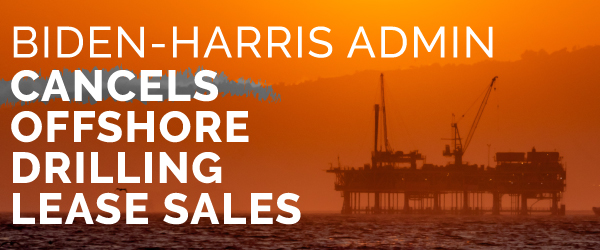
3.) Biden-Harris Administration Cancels Offshore Drilling Lease Sales
This month, the Biden-Harris administration announced that the Department of the Interior would cancel three lease sales for drilling off the coast of Alaska and in the Gulf of Mexico — a major win for advancing climate progress and environmental justice. The leases would have done nothing to reduce today’s gas prices for consumers — but they would have helped keep our country dependent on polluting fossil fuels and further slowed the transition to clean energy.
LCV Conservation Program Director Alex Taurel said, “Offshore drilling is a dirty and dangerous business that threatens coastal communities, economies, and marine life. Selling new offshore leases that won’t produce oil for years is not a solution to today’s gas prices, but it would lock in new infrastructure that is incompatible with our moral responsibility to leave a habitable planet for our kids. That’s why we’re excited to see the Biden-Harris administration’s decision to cancel these lease sales. Our future must be powered by clean energy, not more offshore drilling.”
Related: LCV’s Chispa program has advocated for zero-emission, electric school buses since 2017. This month, LCV and Chispa celebrated the opening of the EPA’s historic, billion-dollar a year Clean School Bus Program, which will help districts replace polluting buses with zero-emission, electric school buses. Chispa Senior National Director Johana Vicente said, “We look forward to working with the EPA in real time to center equity, prioritize electric school buses, and ensure that this initial round of transformational funding will reach the communities this program is intended to help.”
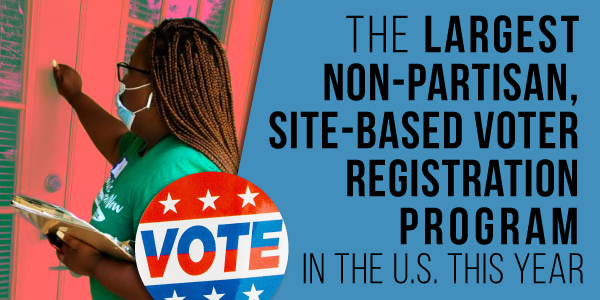
4.) LCV Education Fund Announces Multi-State Initiative to Register Historically Excluded Communities to Vote
On May 19, LCV’s sister organization, LCV Education Fund, announced its 2022 multi-state site-based voter registration program in Arizona, Florida, Nevada, North Carolina, and Pennsylvania — the largest non-partisan, site-based voter registration program in the country this year.
The program will register eligible voters historically excluded from voter registration efforts, including communities of color in urban and rural communities. Potential voters in communities of color and immigrant communities often face obstacles to voting, including language differences and delays in receiving accurate information. LCV Education Fund’s voter registration efforts will help strengthen engagement in the electoral process so that more eligible voters can participate in and be represented in our democracy.
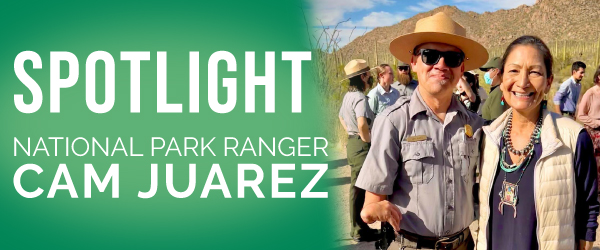
5.) Spotlight on National Park Ranger Cam Juarez
This month, LCV’s blog spotlighted Cam Juarez, a park ranger in Arizona’s Saguaro National Park, who is working to connect with historically excluded communities in the outdoors and empower people to take back public lands and reclaim historical narratives.
Cam introduces himself as the first-generation son of Mexican immigrants from a pueblito in Michoacán, Mexico and shares his pride in his family’s Indigenous Mixtec roots. When he’s out in the field, Cam is deeply conscious that, as a representative of the Park Service, he has a profound effect on whether or not visitors feel welcome to explore spaces that have historically excluded them.
Research reveals an increasing number of Latinx people recreating outdoors and using public spaces in the U.S. over the last ten years. Latinx communities also disproportionately experience health problems caused by social inequities and environmental racism, so encouraging engagement with the outdoors is especially important.
Cam Juarez said, “That’s part of our cultura, connecting to the land to heal ourselves. So public lands to me means much more than just Saguaro National Park, the Grand Canyon, Yellowstone, or Yosemite. It means getting outdoors, and it means community. It also means traditions and sharing experiences across muchas generaciones.”
READ Cam’s spotlight here.